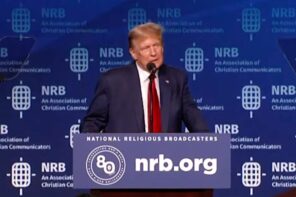Michele Bachmann’s Congressional Tea Party Caucus launched its promised weekly seminars on the US Constitution with Supreme Court Justice Antonin Scalia as the kick-off speaker.
Bachmann invited both Democratic and Republican Congress-members to attend but the perspective on the Constitution promoted by the seminars will clearly be the conservative Christian (and tea party) view that the Founders intended America to be a Christian nation. For some time we have known that amateur historian and self proclaimed scholar of American Christian History David Barton is expected to be one of the speakers.
I’ve written about Barton, a favorite of Glenn Beck, here and here. Sarah has written about him here.
What we can expect from him is a version of American history in which the Founders are faithful Christians guided by God in their establishment of a system of Government based on the Bible. “There’s no God in the Constitution,” you say? Barton bases his views on his reading of what he calls the “founding documents.” This allows him to read the Constitution in the context of the Declaration of Independence that invokes a Creator who endowed human beings with inalienable rights—at least the white, male, land-owning ones.
This week Bachmann doubled-down on this approach when she appeared on Jay Sekulow’s radio show and invited him to serve as a speaker as well. Sekulow has carved out a distinctive space in the religious right. He is lead council for the American Center for Law and Justice (ACLJ), Pat Robertson’s “alternative” to the ACLU which is described on its website as:
pro-life and dedicated to the ideal that religious freedom and freedom of speech are inalienable, God-given rights for all people. The ACLJ engages legal, legislative, and cultural issues by implementing an effective strategy of advocacy, education, and litigation.
Sekulow’s participation in Bachmann’s Constitution seminar would, presumably fall under the “education” aspect of the group’s mission.
All of this comes after the ritual reading of the document and a new Republican-backed requirement that all proposed legislation include an authorizing section noting which part of the Constitution gives Congress the authority to do whatever is proposed in the legislation.
Of course, the requirement to cite authority seems simple enough on the face of it. But as I listened to NPR’s Talk of the Nation earlier this week, host Neil Conan was trying to parse out exactly what it would mean to cite (chapter and verse, shall we say) the Constitutional authority for any proposed action, it occurred to me what we are really doing is adopting a specific style of biblical exegetics found in fundamentalist Protestant churches as a hermeneutical style for reading the Constitution.
Sure some Christians approach the Bible with a concordance, looking up every example of a specific word to develop what they think is the biblical view of a particular question. They can then offer a “proof-text” for their viewpoint.
But there are also many other styles of reading the text, including historical critical studies that seek to place the text, its author and its audience in historical-cultural context; literary criticism that seeks to demarcate different literary styles (say, those that mark the Constitution and the Declaration, for example); linguistic analysis that seeks to explore how language works at structural levels, and so on.
Indeed, these are very complex disciplines that show us, if nothing else, that the meaning of things is not always as clear as it seems. Moreover many theologians have suggested that fundamentalists make the text itself an object of veneration violating the biblical commandment against idolatry.
Yet the new Republican Congress, steeped in tea party “constitutionalism” and Protestant fundamentalism is importing a specific exegetical style into our political process and requiring its adoption by all. Odd thing is, if the “founders intended” a proof-texting requirement, why didn’t they say so?




